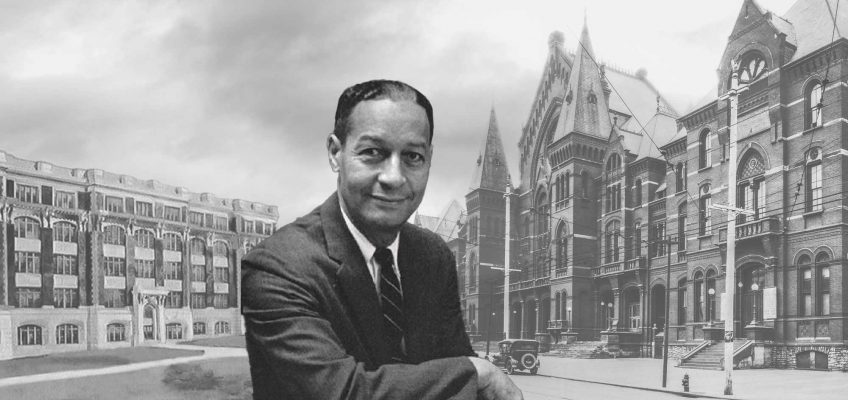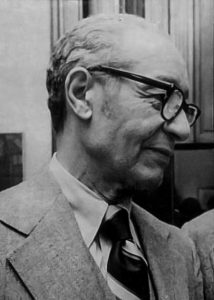
When Cincinnati’s one-time mayor Theodore M. Berry reached a part of his boyhood story, tears came into his eyes. It happened every time he shared his story.
Theodore M. Berry’s most significant Music Hall moments occurred on stage, and in front of the structure, nearly 100 years ago (June 13, 1924), at Woodward High School’s graduation ceremonies.
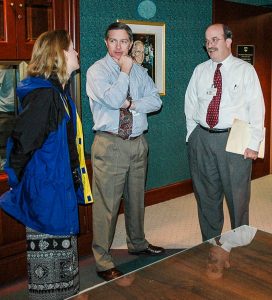
Historian Dan Hurley related this moving story in 2005. Then Assistant Vice President for History and Research at the Cincinnati Museum Center, Hurley was interviewed for a documentary on the history of Music Hall. The story about Berry encompasses a legendary individual’s life-long struggle for equality and fairness.
Ted Berry, the Graduating Senior
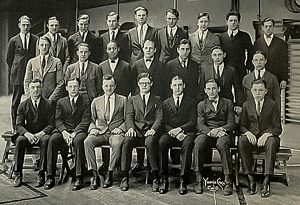
Today graduation speeches are generally given by the class valedictorian. However, in 1924, students wrote speeches and faculty members picked the best presentation — and the valedictorian. Woodward also had a commencement tradition: The class valedictorian would lead the students into their seats, walking side-by-side with the class president.
The faculty selected Ted Berry’s speech. It was a decision that sparked controversy because Berry, who years later became Cincinnati’s first Black mayor, would be walking next to a white girl. In 1924, this pairing was unacceptable.
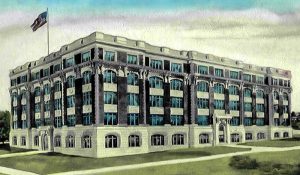
Courtesy Cincinnati Views.
Woodward seniors were then told to write new papers and submit them, this time using a pseudonym. The name Berry chose was Thomas Playfair, an apt alias that underscored the unfair treatment he was receiving. A faculty team again chose Ted Berry’s speech.
School administrators thought an acceptable solution for the procession in Music Hall would be the valedictorian walking alone, followed by the class president. That’s what happened. Berry gave his presentation in the dignified demeanor that would underscore his many achievements, and the graduation ceremonies went off without incident.
“He Did Fine”
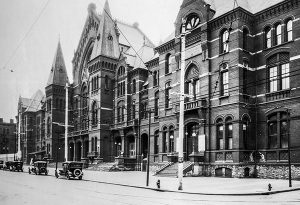
The second memorable experience occurred afterward, in front of the building. As the young valedictorian walked toward Elm Street, he encountered a Black chauffeur, waiting to escort a wealthy white family to their next destination. Not knowing who he was, the chauffeur called out to Berry, “I hear a colored boy gave that talk in there tonight. How did he do?”
Without revealing his personal role, Berry simply said, “He did fine.”
Hurley concluded the story saying
And every time I talked to Mr. Berry about that story, he would tear up, because I think it was a comment on his whole life.
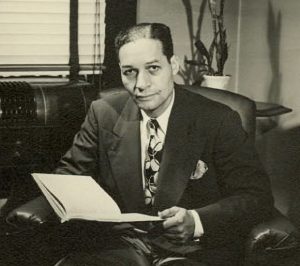
A Legend in His Time
During his life Theodore M. Berry was a lawyer, civil rights activist, and public official. His career, in fact, his entire life revolved around helping people who were the victims of racial prejudices. As one of Cincinnati’s first Black figures, he was keenly aware that his work would be seen as representative of his race. His contributions were many and impactful.
Successive civil rights leaders cite him as a role model for their work.
The late U.S. Court of Appeals Judge Nathaniel Jones said it best:
He was, without question, one of the most significant figures of the second half of the last century. He turned things around here and relentlessly fought to change the status quo. He encouraged people to understand they could make a difference.
He was a genuine folk hero.
Coming Full Circle
Berry’s final public appearance was in 1999. He attended John Hope Franklin‘s lecture, part of the Underground Railroad Lecture Series named in his honor, and the audience gave him a standing ovation. The lecture was held in Music Hall … where graduating student Theodore Berry delivered his commencement address many years earlier.
Resources
The Theodore M. Berry Papers, Archives and Rare Books Library, University of Cincinnati. Special thanks to Kevin Grace, Head and University Archivist, Senior Librarian, Archives & Rare Books Library, University of Cincinnati.
Edwards, Jennifer. “He was a genuine folk hero,” The Cincinnati Post, 16 Oct 2000.
Horstman, Barry M. and Kevin Osborne. “A rainbow coalition mourned for Berry,” The Cincinnati Post, 20 Oct 2000.
Hurley, Dan. “Graduation had Special Meaning for Ted Berry,” The Cincinnati Post, 19 May 2006.
Music Hall: Cincinnati Finds Its Voice, 2005. Historic documentary produced by CET and funded by the Society for the Preservation of Music Hall (now Friends of Music Hall). Joanne Grueter & Sheri Lutz, co-producer/directors.
Friends of Music Hall has a Speakers Series presentation titled Under One Roof: The African American Experience in Music Hall. Contact us by email or by calling (513) 744-3293 to schedule a presentation for your group or organization.
Joanne Grueter wrote this feature. She has been a member of the Friends of Music Hall board since 2005. Grueter is a photographer for FMH and helps with their website and social media. Her heroes include Ted Berry, Marian Spencer and RBG.

